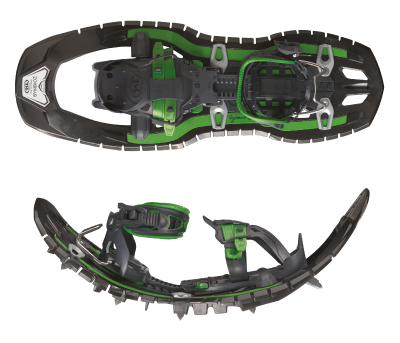Leading snowshoe manufacturer TSL Outdoor selected two Dryflex thermoplastic elastomer grades from global compounding group HEXPOL TPE for their hyper-flexible and lightweight snowshoes. With an ever increasing refuse stream, Government waste prevention programmes and new industry targets, the demand for products made from recycled materials is rising, meaning that recyclability is becoming an increasingly important attribute for polymers. However, thermomechanical degradation from the repeated melting during the recycling process, weathering and contamination can all have negative effects on properties and performance. Compatibilization About HEXPOL TPE SOURCE:https://www.hexpoltpe.com/en/news.htm?id=411
Leading snowshoe manufacturer TSL Outdoor selected two Dryflex thermoplastic elastomer grades from global compounding group HEXPOL TPE for their hyper-flexible and lightweight snowshoes.
TSL Outdoor snowshoes are specially designed for mountain regions with temperate climates. They are designed to give a sure and safe grip, be easily adjustable for user comfort and include several high-tech features for precise tracking. The design of the snowshoes allows them to adapt to the unevenness of the terrain to give better traction while allowing for a natural movement of the foot.
HEXPOL TPE developed two Dryflex TPE compounds for the TSL Symbioz snowshoes. One of the TPE compounds is used as part of TSL’s patented Sound and Shock Absorbing System (SSAS), where the softness and flexibility of the TPE helps to create a cushioning function and aids user comfort. The second TPE compound was developed for a bi-material, comfort strap.
Speaking of the project, Yoan BIBOLLET, R&D Engineer at TSL Outdoor commented “For our new ankle clamping design, we were looking for materials that offer comfort for the user while maintaining good mechanical strength. With the wide range of properties available from Dryflex TPEs, we were confident that we would find the right materials for our specifications. The quality of Dryflex TPEs ensures the chemical adhesion between the soft zones (for the comfort) and hard zones (for the mechanical forces). This has allowed us to develop several new applications for our outdoor products, especially in Nordic walking sticks. Previously, this piece was made of textile and produced in Asia, the new bi-material TPE strap has also allowed us to relocate production to our injection moulding site in Haute-Savoie. The relocation gives us greater flexibility and offers more customization possibilities for special series (for example the ease of colour change), whereas our previous textile version imposed high minimum quantities for special colors”.
Dryflex TPE impact modifiers can be added to the recyclable, helping to transform the properties from stiff and brittle to flexible and tough and improve the impact resistance and aesthetics of the finished product. Dryflex TPE compounds are being used as impact modifiers in both primary and secondary recyclable supply streams.
Dryflex TPE impact modifiers can also function as a compatibilizer when used with commingled sources of non-polar polymers such as PP, PE and PS. When added to an immiscible polymer blend, the TPE modifies interfacial properties and stabilises the morphology, creating a polymer alloy and improving dispersion and processing characteristics.
Improved Processing
Depending on the purity of the recycled polymer feedstock, the addition of Dryflex TPE impact modifiers can also help to improve melt viscosity, aiding processing and cycle times. In comparison to pure PS, with the addition of Dryflex TPE impact modifiers, we have also seen an improvement in the ease of de-moulding parts
Addition levels
Depending on the desired performance levels, Dryflex TPE impact modifier grades can be added at a suggested loading weight between 5 %and 25%.
There can be significant gains in impact resistance at a moderate level of modifier addition. For example, in a grade of PS regrind, with a 15% addition of Dryflex TPE there is an 160% increase in impact resistance, as measured to Charpy ISO 179 (type 1 test piece, notch A). In a virgin crystal polystyrene, a 25% addition of Dryflex TPE impact modifier gave over a 430% increase in impact resistance.
HEXPOL TPE is a global polymer compounding group specializing in Thermoplastic Elastomers (TPE) for key industries such as consumer, medical, packaging, automotive and construction. Driven by a core belief in being the easiest company to do business with, HEXPOL TPE is dedicated to delivering a trusted combination of application know-how, R&D, production capabilities and comprehensive technical services. As part of the HEXPOL group of companies, we share an extensive global footprint covering EU, Asia-Pacific and North America, enabling us to support our customers worldwide.
